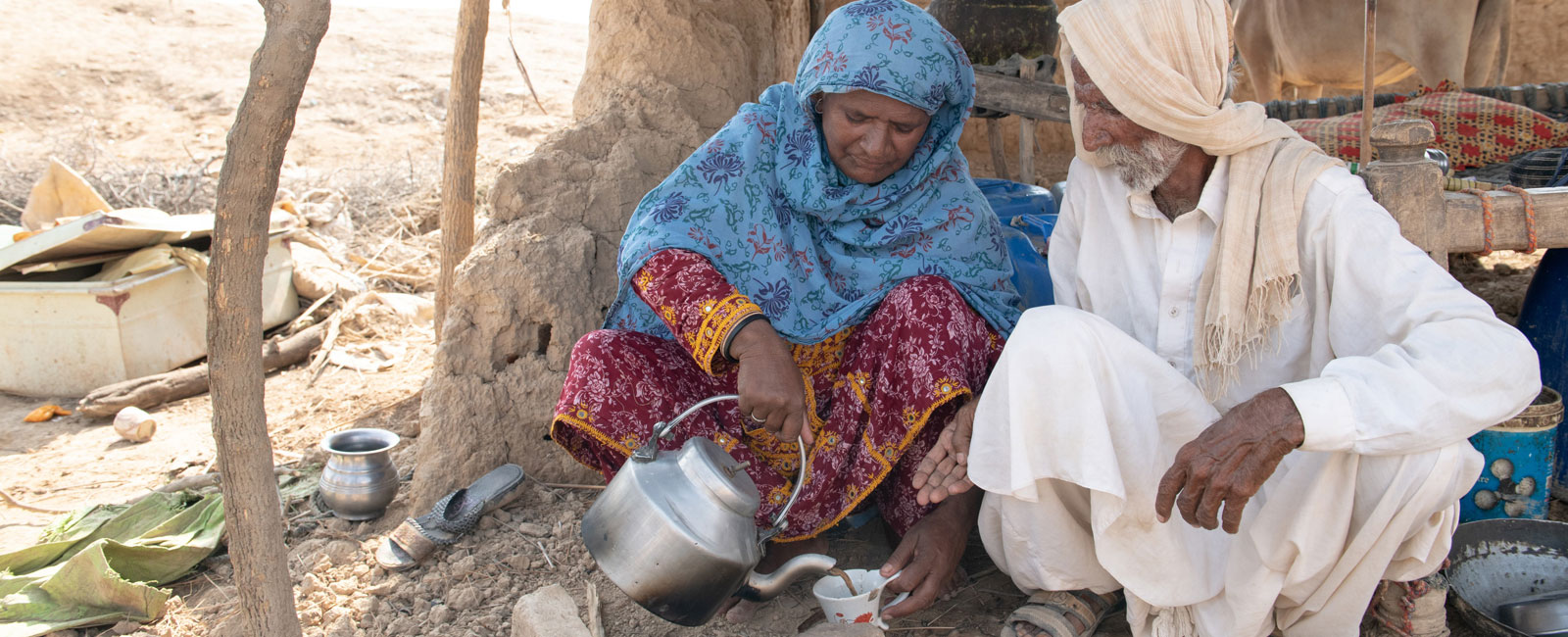How relentless floods hit the ailing elderly the hardest
There is a large number of ailing old flood victims struggling to stay afloat after floods displaced them from their humble dwellings

When the floods were bucketing towards his village in Sindh’s Khairpur district, Nazil Solangi, 60, lay in his cot, tormented by the thought of how is he going to find his feet to escape to safety when the runway waters overrun his dwellings like mighty armies of foreign invaders, and rightly so as he was mostly cot-ridden for the last ten years after suffering a stroke.
And when the dreaded deluge rolled into his village with all its force, Solangi’s kind neighbours had to wade through the shifting floodwaters to carry him away to higher ground with much difficulty. Most of the elderly were rushed to safety that way, thanks to selfless rural social bonds.
“The local dispensary was damaged and there are no doctors to look after us. When my husband fell sick, my son became the only breadwinner of the family. After the floods, he couldn’t find any work, and most of our livestock was killed. We sold the last one to meet the basic needs of our family. We don’t know what will happen in the future,” said Naheed Solangi, 60, Nazil’s spouse, speaking to the activists of Helpage, a non-profit organisation.
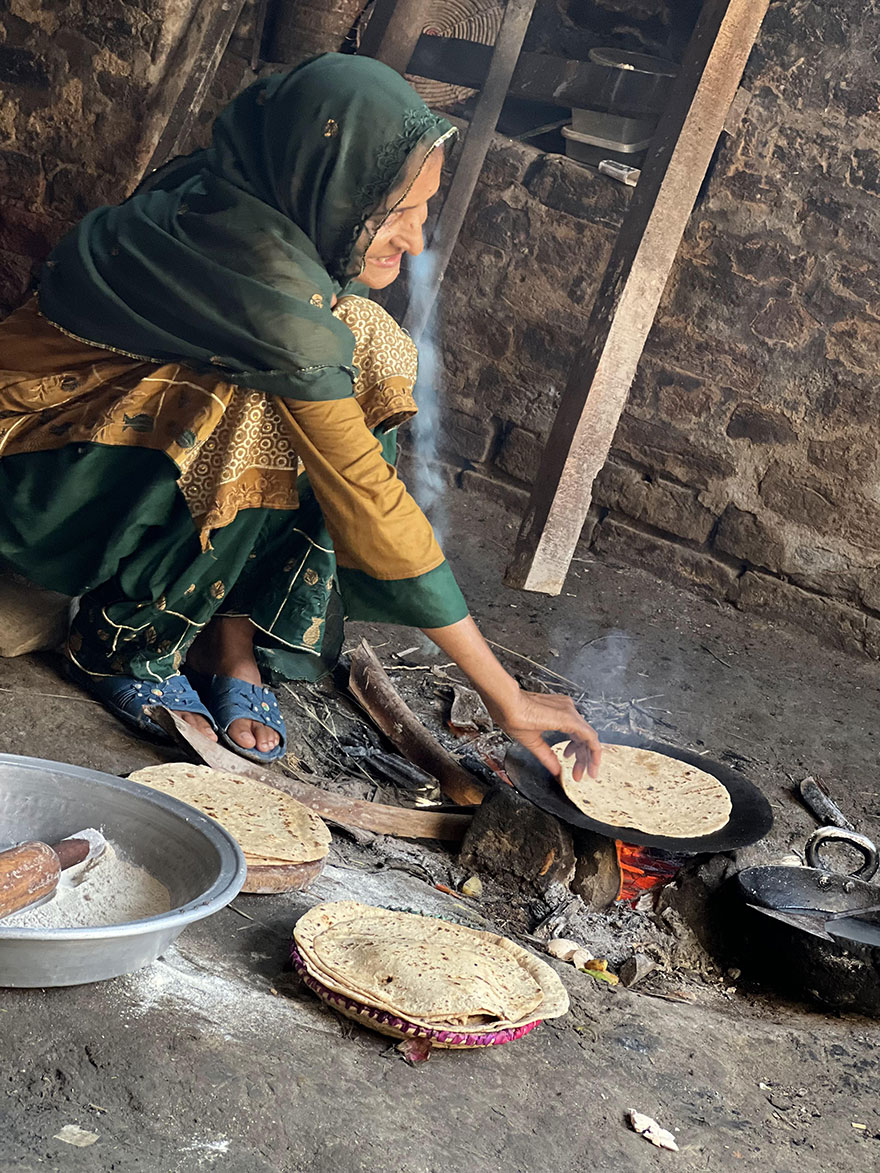
The ageing Solangi family is not alone in this ordeal. There is a large number of ailing old flood victims struggling to stay afloat after floods displaced them from their humble dwellings. Villagers usually thought of as being tough as nails have their own vulnerabilities.
The topmost is healthcare, which is scarce in the remote parts of rural Sindh. The already immunocompromised elderly are the ones that need the most care as they are natural magnets to water-borne as well as vector-borne (insect-bite-caused) and other infectious maladies in the areas that have been claimed by the floodwaters and turned nearly into cesspools over time.
Nazil, who is dependent on medication to stay alive, was forced to live under the open sky for two weeks, which worsened his condition. His house was completely flooded and he lost the roof and all his belongings.
Unfortunately, he had no choice but to return to live in the damaged house. He is no longer able to access his blood-thinning medicine and became ill. His son had to take him to the nearest hospital to get treatment and to be able to access his medication.
“The local dispensary was damaged and there are no doctors to look after us. When my husband fell sick, my son became the only breadwinner of the family. After the floods, he couldn’t find any work, and most of our livestock was killed. We sold the last one to meet the basic needs of our family. We don’t know what will happen in the future,” Solangi’s wife added.
A new survey on the impact of the floods in Pakistan on older people reveals that hundreds of lives are needlessly being put at risk due to the decimation of health services and the rise of diseases like malaria and diarrhoea, which can be killers to older people with weaker immune systems.
The survey from HelpAge International highlighted that 87% of older people in flood-affected areas of Pakistan have a health condition, but only 51% have access to healthcare, while the government and UN assessment reports are largely ignoring their needs and rights.
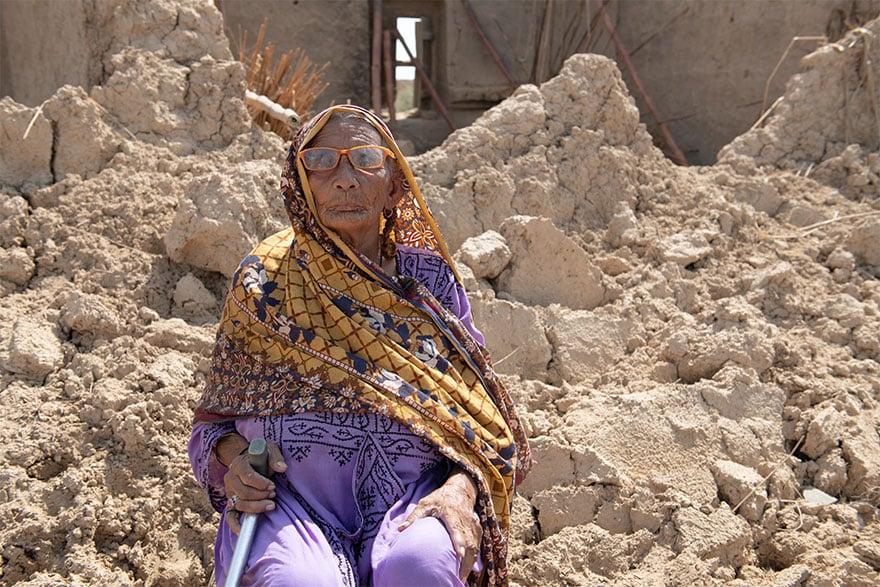
“So many older people with serious health conditions lost their medication in the floods. The health centres were either swept away or destroyed, along with the contents. And many older people cannot reach the health centres that are functioning and even if they can, they cannot afford to buy the medication they need. Tragically, hundreds of older people will die because of this,” said Syed Moeez, HelpAge Pakistan country director.
More than 1,500 health and support facilities have been badly damaged by the floods.
Of the older people interviewed who have access to health services, more than half said they were too expensive and over a third said that they do not have sufficient medical supplies. Only basic healthcare centres or private clinics are available to most people, and these fail to meet the needs of those most at risk.
Latifa Khatoon, 85, and her only son, Fateh Muhammad, live amongst the ruins of their mud-plastered home in Ullah Ghumro, a small village in Khairpur District, Sindh.
The floods destroyed their boundary wall and they are surrounded by deep, stagnant water, which has led to an increase in mosquitoes and hence the incidence of malaria.
Over 80% of the villagers are suffering from the disease but the village health facility no longer exists; there are no doctors to diagnose or treat illnesses and the pharmacy lacks medicines, meaning people are turning to traditional remedies.
“I couldn’t find any medicine in my village while I had a high fever. I got to know that it’s malaria when my neighbour visited a doctor in another city and she had the same symptoms,” said Latifa.
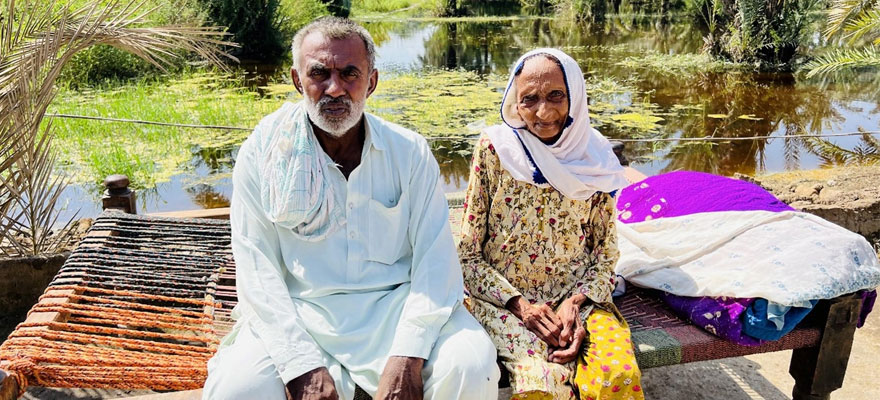
Already at risk of chronic diseases and with ageing immune systems, older people in Pakistan are finding it harder to fight against parasitic vector-borne infections such as malaria.
These are increasing as a result of the now stagnant water and mosquitoes, especially in Sindh province where 85% of those surveyed by HelpAge have no shelter.
“It’s heartbreaking to see vulnerable older people sleeping in the open air, right next to stagnant waters, a breeding ground for malaria-carrying mosquitoes as well as multiple waterborne diseases. It is vital that they have nutritious food and clean water to help them fight these diseases,” said Moeez.
In Sindh, 78% of people over 50 surveyed do not have enough food and 59% have no access to clean drinking water. Older people are also struggling to reach toilets (63%) and bathing facilities (62%).
This is causing water-borne diseases, like cholera, diarrhoea, typhoid, amebiasis, hepatitis, gastroenteritis, etc which can prove fatal when immune systems are weaker.
A third of interviewees have at least one disability and two-thirds said they were unable to reach aid distribution points. So many have lost assistive devices, such as glasses, walking sticks and frames and have no money to buy new ones.
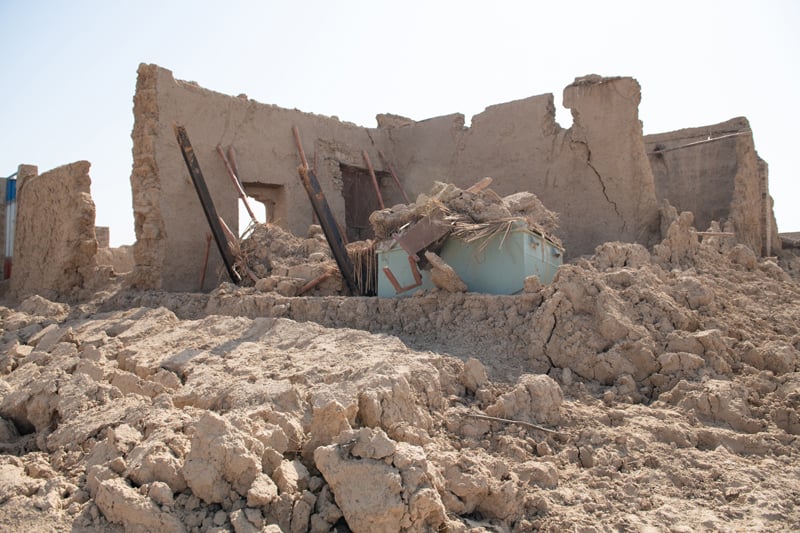
Malooka Khatoon, 70, and her husband Muhammad Bux have lived their whole lives in Pat Karira in Jhal Magsi, Balochistan. Like most families in Pat Karira, they had to escape for their lives when the flash floods engulfed their village.
“We left our houses in panic and moved to the Jhal Magsi road. I slipped on the mud during the floods and injured my leg,” said Malooka Khatoon. “This left us with terrible memories. We lost our crops and most of our livestock.
“Before the floods, we were busy farmers and we earned a decent living,” she added.
"Now we live in a tent, back where our home used to be. Our life is very different and difficult. We have no income and not enough food. We had to sell the last goats we had to buy food and other essential items. We are no longer able to earn a living; we have lost everything except our lives. We are depressed and worried about our losses," Khatoon sai
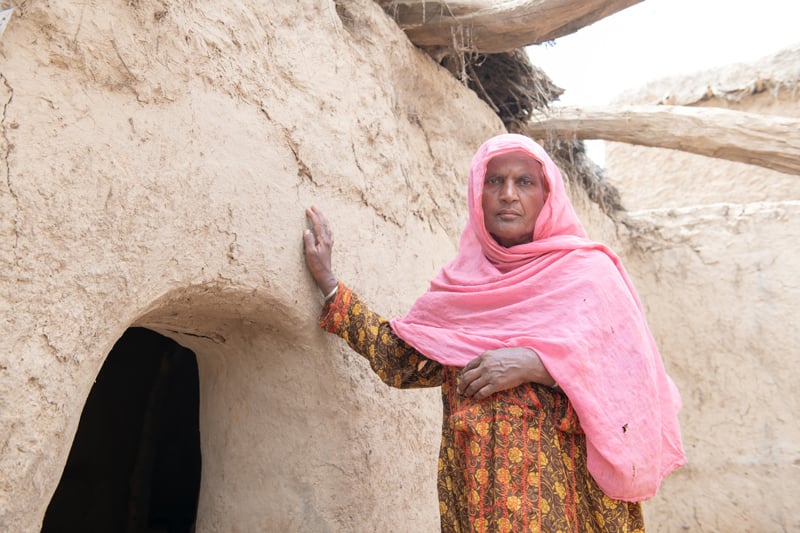
“We have no clean water as the pipes were damaged and I have hepatitis due to the muddy water. There are no medical supplies and even if there were, we couldn’t afford them.”
A large number of older people were actively working before the floods, but now only 24% of those surveyed have an income. A worrying 61% of those who have been displaced have had to borrow money to get by. The survey shows that the highest safety concern mentioned by older men and women is financial abuse (38%) such as family members stealing from them.
Outside the public sector workforce, only 2.3% of older people in Pakistan receive a pension, so if they are not able to work, they are entirely dependent on aid or their families to survive.
Older people play a vital role in families in Pakistan. This becomes even more important in times of emergency when family members are displaced or migrate for work. But older people who are barely able to meet their own basic needs, are also caring for children, with 78% of those interviewed caring for three or more children. Unsurprisingly, many older people are experiencing severe anxiety.
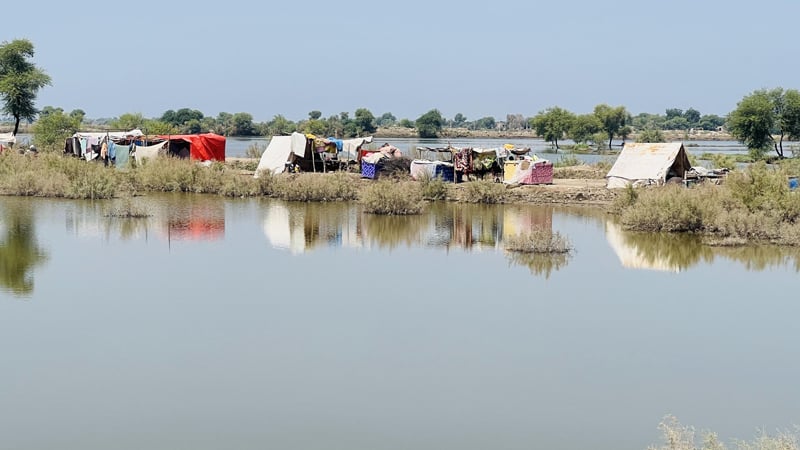
“Older people who were weaker before the floods are now literally fighting for their lives,” said Syed Moeez adding: “And the ones who were active are now completely dependent on others. And this could get worse when winter arrives. We all have to do what we can to support them to live safely and with dignity and ensure they can participate and contribute as they wish, as equal and active members of society”.
Thumbnail image: Mai Husna, the wife of Ali Bux, 70, pours tea for her husband, which she brewed with great difficulty on a makeshift firewood brick stove in the flood-hit Village of Mir Pur in Balochistan. — Helpage



